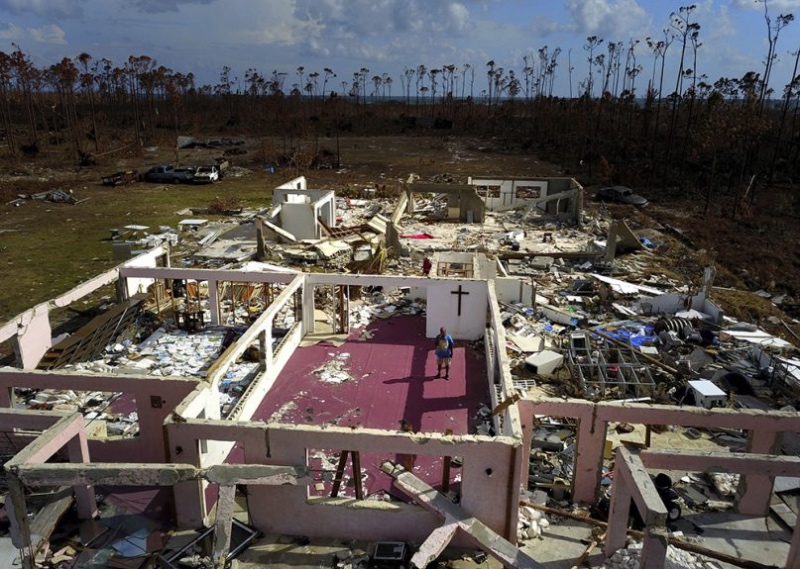
In an article first published on Religion News Service, JAMIE ATEN, author and founder and executive director of the Humanitarian Disaster Institute at Wheaton College, looks at the ideas of resilience and its Biblical counterpart, “spiritual fortitude”…
Little did I know, a near-death cancer experience would change my whole outlook on the very topic I had spent my career studying: resilience.
Commonly defined as our ability to bounce back from adversity, resilience has of late been touted as the key to a successful life. But definitions like this one didn’t resonate with my personal experience of suffering from cancer. I had failed to experience the “bouncy” quality of resilience.

Pastor Jeremiah Saunders stands among the ruins of his church that was destroyed by Hurricane Dorian, in High Rock, Grand Bahama, Bahamas, on 11th September. PICTURE: AP Photo / Ramon Espinosa.
“[I]n my work with disaster survivors from around the globe, I saw that other people’s experiences with recovering their lives were also sometimes at odds with popular notions of resilience. As a Christian, this led me to start wondering if there might be a Biblical equivalent to the psychological concept of resilience, or perhaps a more robust counterpart.”
Similarly, in my work with disaster survivors from around the globe, I saw that other people’s experiences with recovering their lives were also sometimes at odds with popular notions of resilience. As a Christian, this led me to start wondering if there might be a Biblical equivalent to the psychological concept of resilience, or perhaps a more robust counterpart.
This isn’t to suggest that resilience isn’t helpful; I still think resilience is important for facing hardship. However, as I had experienced and we had witnessed, there appeared to be a need for another way to understand and describe what it meant to weather life’s hardships, especially from a faith perspective.
This need for a fresh understanding wasn’t rooted solely in my experiences and personal observations: Data from several of our studies at the Humanitarian Disaster Institute pointed to a gap and need for further study.
Other studies, such as one led by Arizona State University researchers Frank Infurna and Suniya Luthar, had also begun to highlight that natural resilience to life-altering events (eg, spousal loss) may be less common than most assume. Using a longitudinal dataset dating back to the early 1980s, Infurna and Luthar found that participants who experienced a significant life stressor experienced sharp declines in well-being that sometimes persisted for years.
Recently our team, led by Dr Daryl Van Tongeren of Hope College, published an article in the American Psychological Association journal Psychological Trauma comprising several studies on spiritual fortitude that sought to identify what was happening in some survivors. For scientific purposes, we described spiritual fortitude as “enabling people to endure and make redemptive meaning from adversity through their sacred connections with God, others, and themselves”.
At the core of fortitude is the ability to cope with long-suffering. While one of the hallmarks of resilience is expedited recovery from adversity, fortitude places greater value on endurance.
Our studies showed spiritual fortitude’s effects to be distinct from resilience and grit (ie, the perseverance for long-term goals). Whereas resilience might be thought of as what helps us push through suffering to get back to life, we found that fortitude helps us find life amid the suffering:
That is, spiritual fortitude enables us to reconceptualize flourishing where a positive outcome is not guaranteed (ie, terminal illness) or may be difficult for a prolonged period (ie, disaster-impacted populations).
As we wrote in our article, “spiritual fortitude predicted well-being, meaning, lower anxiety, and greater religious coping, above and beyond the predictive power of grit and resilience.”
“Though new to empirical psychological science, fortitude is not a new concept. The church has long taught fortitude as the virtue of adversity and named it as one of the Biblical fruits of the spirit, in the phrase Paul uses in Galatians. Thomas Aquinas defined fortitude as an act of ‘brave endurance’.”
Though new to empirical psychological science, fortitude is not a new concept. The church has long taught fortitude as the virtue of adversity and named it as one of the Biblical fruits of the spirit, in the phrase Paul uses in Galatians. Thomas Aquinas defined fortitude as an act of “brave endurance”.
Within the Christian tradition, fortitude is commonly associated with pursuing good in the face of fear and hardship, which we also found evidence of.
Spiritual fortitude also differed from resilience in that it allowed the sufferer to think of others. “Spiritual fortitude may foster right actions on the behalf of others for the greater good and not personal gain despite adversity,” we wrote.
Fortitude has also been characterized as “the guard and support of the other virtues”. Our findings support this characterisation of spiritual fortitude as a “guard”. Results indicated spiritual fortitude may not only help protect character strengths but may actually provide practices for making use of one’s suffering.
Taken as a whole, our series of studies revealed that fortitude helps people persist in the face of challenges, leading to positive mental health outcomes and flourishing. This offers hope to anyone living through adversity; it allows us to relieve ourselves of the pressure to “bounce back” to the way we were before. Often life’s biggest challenges change us, and that is OK – we now know that there’s great value in simply enduring.
As Paul wrote in his Second Letter to Timothy: “I have fought the good fight, I have finished the race, and I have remained faithful.”
Jamie Aten is the founder and executive director of the Humanitarian Disaster Institute at Wheaton College. His most recent book is A Walking Disaster: What Surviving Katrina and Cancer Taught Me about Faith and Resilience.





